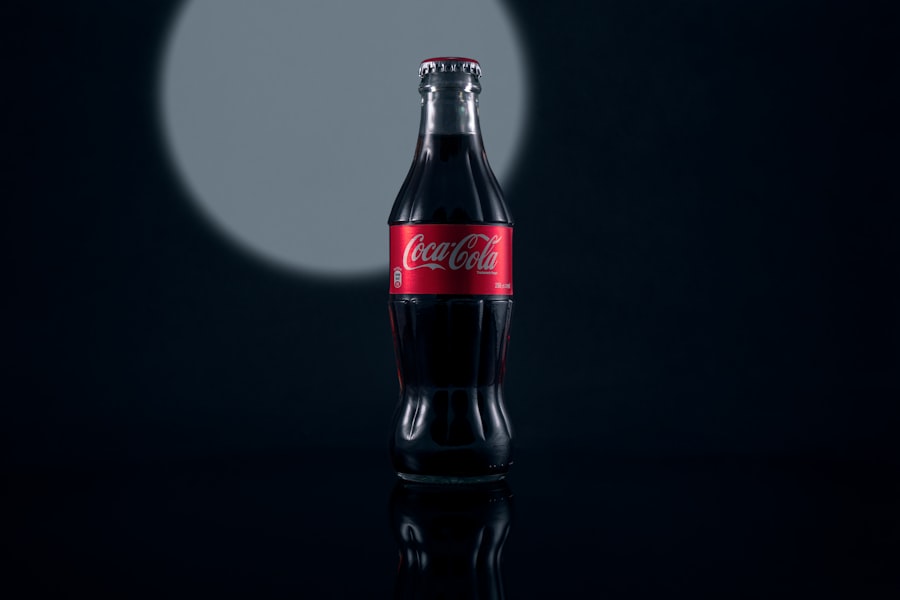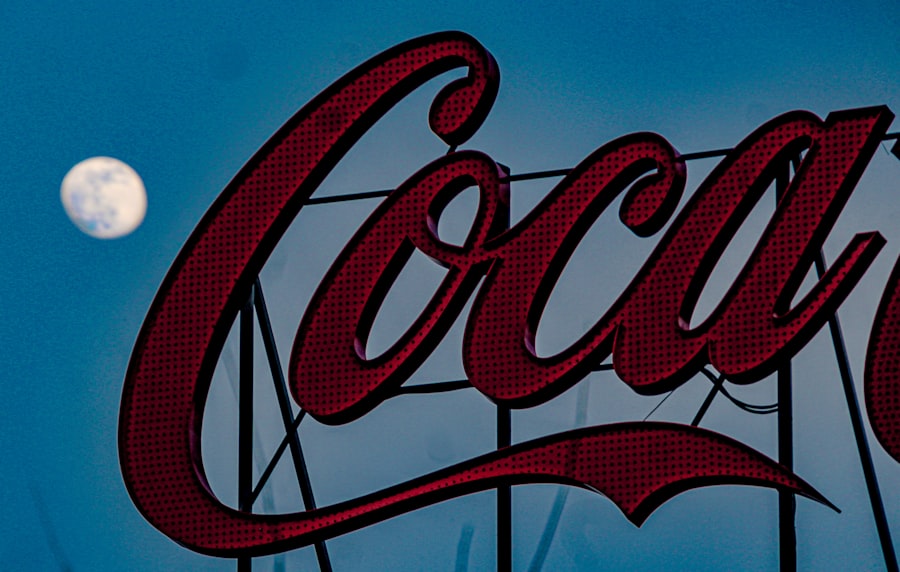Cristiano Ronaldo, one of the most recognizable figures in sports, made headlines during a press conference at the Euro 2020 tournament when he visibly disapproved of a Coca-Cola product placement. The incident occurred when he removed two bottles of the soft drink from the table in front of him, replacing them with a bottle of water. This seemingly simple act sent shockwaves through the marketing world, as it highlighted the stark contrast between Ronaldo’s personal brand and the sugary beverage that Coca-Cola represents.
His gesture was not merely a spontaneous reaction; it was a calculated statement reflecting his commitment to health and fitness, values that resonate deeply with his image as an elite athlete. Ronaldo’s disapproval of Coca-Cola was not just a personal preference but also a reflection of broader societal trends regarding health and nutrition. As an athlete who has dedicated his life to maintaining peak physical condition, Ronaldo’s actions underscored the growing awareness around the negative impacts of sugary drinks on health.
His influence extends beyond the football pitch; he is a role model for millions, particularly young athletes who look up to him for guidance on how to lead a healthy lifestyle. By publicly rejecting Coca-Cola, Ronaldo sparked conversations about the choices we make regarding our diets and the implications those choices have on our overall well-being.
Key Takeaways
- Ronaldo publicly disapproved of Coca-Cola, highlighting his health-conscious stance.
- Coca-Cola’s stock experienced a noticeable drop following Ronaldo’s gesture.
- Celebrity endorsements significantly influence consumer behavior and brand value.
- Athletes hold considerable sway in shaping public opinions and lifestyle choices.
- The incident sparked broader discussions on sugary drinks and the responsibility of sponsorships.
Impact on Coca-Cola’s Stock:
The immediate aftermath of Ronaldo’s disapproval was felt in the financial markets, particularly in Coca-Cola’s stock performance. Following the incident, shares of the beverage giant experienced a notable decline, losing approximately $4 billion in market value within hours. This reaction illustrates the profound impact that celebrity endorsements and public perceptions can have on corporate fortunes.
Investors are acutely aware that consumer sentiment can shift rapidly, especially when influenced by high-profile figures like Ronaldo, whose endorsement or disapproval can sway public opinion significantly. The decline in Coca-Cola’s stock price serves as a stark reminder of the power that athletes wield in today’s market. In an era where social media amplifies every action and statement, a single moment can lead to substantial financial repercussions for major corporations.
The incident also raised questions about the effectiveness of traditional advertising strategies in an age where authenticity and health consciousness are increasingly valued by consumers. As more individuals become aware of the health risks associated with sugary beverages, companies like Coca-Cola may need to reevaluate their marketing approaches to align with changing consumer preferences.
The Power of Celebrity Endorsements:

Celebrity endorsements have long been a cornerstone of marketing strategies across various industries, but Ronaldo’s actions highlighted the potential pitfalls of relying solely on star power. While endorsements can drive sales and enhance brand visibility, they can also backfire dramatically if the celebrity’s values do not align with those of the product being promoted. In Ronaldo’s case, his commitment to fitness and healthy living starkly contrasted with Coca-Cola’s sugary offerings, leading to a public relations challenge for the brand.
The effectiveness of celebrity endorsements hinges on authenticity; consumers are increasingly discerning and can quickly detect when a celebrity is promoting a product that contradicts their personal beliefs or lifestyle. This phenomenon is particularly relevant in the realm of health and wellness, where consumers are more inclined to trust figures who embody the values they aspire to adopt. As such, brands must carefully consider their partnerships and ensure that their ambassadors genuinely represent their products’ ethos.
The fallout from Ronaldo’s disapproval serves as a cautionary tale for companies that may overlook this critical aspect of brand alignment.
Athletes and Their Influence:
| Athlete | Sport | Social Media Followers (Millions) | Brand Endorsements | Philanthropic Impact | Global Influence Score |
|---|---|---|---|---|---|
| Serena Williams | Tennis | 15 | 12 | High (Education & Equality) | 92 |
| LeBron James | Basketball | 100 | 20 | High (Youth & Social Justice) | 98 |
| Cristiano Ronaldo | Soccer | 550 | 30 | Medium (Health & Disaster Relief) | 95 |
| Simone Biles | Gymnastics | 10 | 8 | High (Mental Health Awareness) | 89 |
| Usain Bolt | Track & Field | 8 | 10 | Medium (Youth Sports Programs) | 85 |
Athletes have emerged as powerful influencers in contemporary society, transcending their roles as mere competitors in sports. Their platforms allow them to advocate for various causes, including health, fitness, and social issues. The influence of athletes like Ronaldo extends beyond their performance on the field; they shape cultural narratives and consumer behaviors through their actions and endorsements.
This phenomenon is particularly pronounced among younger demographics, who often idolize these figures and emulate their lifestyles. The impact of athletes on consumer behavior is evident in various sectors, from sports apparel to nutrition products. Brands recognize that aligning with athletes who embody their values can enhance credibility and foster deeper connections with consumers.
For instance, companies like Nike and Adidas have successfully leveraged athlete endorsements to promote not only their products but also messages around empowerment and perseverance. As athletes continue to embrace their roles as advocates for healthy living, their influence will likely grow, prompting brands to adapt their strategies accordingly.
Ronaldo’s Health Consciousness:
Cristiano Ronaldo’s commitment to health and fitness is well-documented; he follows a rigorous training regimen and adheres to a strict diet that prioritizes whole foods over processed options. His lifestyle choices reflect a broader trend among elite athletes who recognize the importance of nutrition in optimizing performance. Ronaldo’s disapproval of sugary drinks like Coca-Cola aligns with his philosophy that what one consumes directly impacts athletic performance and overall well-being.
Ronaldo’s approach to health extends beyond personal choices; he actively promotes fitness and wellness through various platforms, including social media. By sharing insights into his training routines and dietary habits, he inspires millions to adopt healthier lifestyles. This commitment to health consciousness not only enhances his brand but also positions him as a credible advocate for wellness in an age where many are seeking guidance on nutrition and fitness.
His actions serve as a reminder that athletes can play a pivotal role in shaping public perceptions about health and nutrition.
The Debate on Sugary Drinks:

The conversation surrounding sugary drinks has gained momentum in recent years as public health officials raise concerns about their contribution to obesity and related health issues. Studies have linked excessive sugar consumption to various ailments, including diabetes, heart disease, and dental problems. As awareness grows, consumers are increasingly scrutinizing their beverage choices, leading to a decline in soda consumption in some markets.
This shift presents both challenges and opportunities for beverage companies like Coca-Cola, which must navigate changing consumer preferences while addressing health concerns. Ronaldo’s disapproval of Coca-Cola serves as a microcosm of this larger debate about sugary drinks. His actions resonate with a growing segment of the population that prioritizes health over convenience or taste when it comes to beverage choices.
As more individuals seek alternatives to sugary sodas—such as flavored water or natural juices—companies must adapt their product offerings to meet evolving consumer demands. The challenge lies in balancing traditional marketing strategies with an increasing emphasis on health-conscious messaging that aligns with contemporary values.
The Future of Sponsorship Deals:
The landscape of sponsorship deals is evolving rapidly as brands recognize the need for authenticity in their partnerships with athletes. The incident involving Ronaldo and Coca-Cola underscores the importance of aligning brand values with those of endorsers. Moving forward, companies may prioritize collaborations with athletes who genuinely embody their brand ethos rather than simply leveraging star power for visibility.
This shift could lead to more meaningful partnerships that resonate with consumers on a deeper level. As brands navigate this new terrain, they will likely seek out athletes who are not only successful in their respective sports but also advocate for healthy lifestyles and social responsibility. This trend may result in sponsorship deals that emphasize wellness initiatives or community engagement rather than solely focusing on product promotion.
By aligning with athletes who share their values, brands can foster stronger connections with consumers while contributing positively to societal conversations around health and wellness.
The Role of Athletes in Promoting Healthy Lifestyles:
Athletes have a unique opportunity to influence public perceptions about health and wellness due to their visibility and credibility. As role models for millions, they can inspire positive changes in behavior by promoting healthy lifestyles through their actions and endorsements. The incident involving Ronaldo serves as a powerful example of how athletes can leverage their platforms to advocate for better dietary choices and raise awareness about the impact of sugary drinks on health.
In an era where lifestyle-related diseases are on the rise, athletes’ voices are more critical than ever in promoting healthy living. By sharing their experiences and insights into nutrition and fitness, they can empower individuals to make informed choices about their health. Furthermore, as more athletes embrace this role as advocates for wellness, they contribute to shifting cultural narratives around diet and exercise, encouraging society at large to prioritize health over convenience or indulgence.
Through their influence, athletes can play a pivotal role in shaping a healthier future for generations to come.



